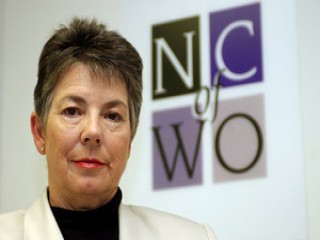
Martha Burk biography
Date of birth : 1941-09-18
Date of death : -
Birthplace : Tyler, Texas, U.S.A
Nationality : American
Category : Politics
Last modified : 2011-09-19
Credited as : political psychologist, feminist, National Council of Women's Organizations
0 votes so far
Born in 1941, Burk grew up in Pasadena, Texas, a suburb of Houston. She earned top grades in high school and finished at age 16; her studies at the University of Houston were interrupted by marriage and the birth of her first child. Living in Dallas with her pharmacist husband, who ran a chain of drug stores, she became a parent again in 1965 and found herself increasingly dissatisfied with her role as a wife and mother. As she told Peter J. Boyer in a profile that appeared in the New Yorker, "the most radicalizing experience in my life was being a stay at home mother. It forced isolation for women in that situation."
Returning to school, Burk received a master's degree in psychology and computer science from the University of Texas at Arlington, and then a Ph.D. in experimental psychology in 1974. Armed with top credentials, she was shocked to find that her gender nevertheless hampered her in the workforce; when she tried to land one university teaching job, she was asked to take a typing test. Around 1979, while at the University of Texas, she developed an educational software program that became the basis for her own company. The business became so successful that she was able to quit her teaching job, and she then turned to political activism. After a divorce, she married an accounting professor, Ralph Estes, with a strong political streak himself, and when he took a teaching job in Kansas, the couple settled in Wichita. There Burk became involved in a contentious battle over a local women's health clinic in the mid 1980s, and eventually headed the Wichita chapter of the National Organization for Women.
In 1990, Burk and her husband moved to Washington, D.C., where they established the Center for the Advancement of Public Policy, an advocacy group. Burk eventually became chair of the National Council of Women's Organizations (NCOW), an umbrella association of various groups that range from the Association of Junior Leagues International to the League of Women Voters. Burk's job entailed calling public attention to women's issues such as pay equity in the workplace and violations of the Title IX federal law that guarantees equal athletic opportunity for men and women at schools and colleges.
Burk, an occasional golfer from years back, cared little about the game until she read an article about the Augusta National golf club's men only membership that appeared in USA Today around the time of the 2002 Masters Tournament. Irked, she decided to write a letter on NCOW letterhead to the club's president, William W. "Hootie" Johnson, that questioned the decades old ban and urged him to revise it. Founded in 1932, the Augusta golf club is one of the most elite private clubs in the United States. Women are ineligible to join, but they may play the course at the invitation of a member. The roster includes some of the most celebrated business leaders in America, such as Sanford (Sandy) Weill, outgoing head of Citigroup, and longtime General Electric chair Jack Welch.
To her surprise, Johnson responded with a blistering 18 paragraph statement released to the media. "The message delivered to us was clearly coercive," it stated, according to the New Yorker article by Boyer. Johnson asserted that "there may well come a day when women will be invited to join our membership but that timetable will be ours and not at the point of a bayonet." Burk was suddenly bombarded with requests for media interviews, and gained the support of the NCOW board to pressure CBS, which televises the Masters Tournament, and launch a letter writing campaign to Tournament sponsors and Augusta members.
Over the next few months, Burk and Johnson fought a war of words in the press. The Augusta golf club released CBS and the sponsors from their signed contracts for the 2003 Masters Tournament a $20 million shortfall that the club agreed to cover and Burk announced her intention to hold formal protests outside the Tournament the following April. Supporters of Burk's cause, which included the New York Times editorial pages, denounced the Augusta club as a stiff, elitist organization, while Johnson argued that it was a private organization and was not bound by any law to admit women.
Burk and the NCOW applied for a permit to protest outside of the club's main gates during the 2003 Masters Tournament, but the local sheriff claimed it might prove a safety hazard, and they were forced to stage their demonstration a half mile down the road. The demonstrations proved neither a public danger nor enough to sway Johnson, but a few weeks later Swedish born golfer Annika Sorenstam was allowed to play in a Professional Golfers' Association event in Texas. The Augusta National golf club remained a staunchly men only enclave. In June of 2003, two House of Representative Democrats introduced a bill that would prohibit tax deductions for business entertaining expenses at private clubs that discriminate on the basis of gender. Burk supported the legislation, which targets 24 private clubs in the United States that, like Augusta, either bar women from membership or restrict access to facilities. "If corporate CEOs believe that entertaining at clubs is necessary for business," a Knight Ridder/Tribune Business News report quoted her as saying, "and that such business expenses should be tax deductible, there are many, many fine clubs that do not discriminate."
















